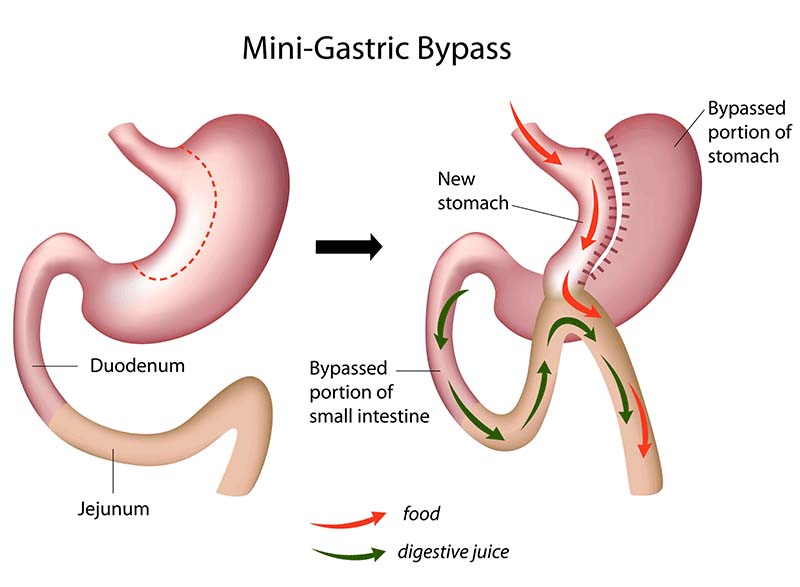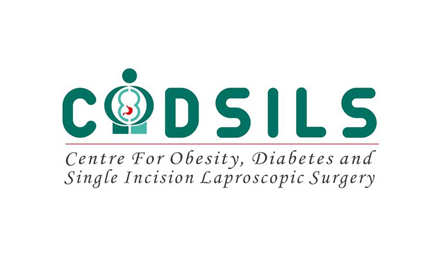
Mini Gastric Bypass Surgery
Mini Gastric Bypass Surgery also known as single anastomosis gastric bypass, in which a long gastric pouch is created and is directly attached to the small intestine. It is a simple, safe, rapid and powerful bariatric operation. It leads to an excess weight loss of 70 to 80% at the end of 2 years. Patients need to be on nutritional supplements like iron, calcium, proteins and multivitamins for life.
Mini Gastric Bypass (MGB) is a modification of Roux en y gastric bypass. In this procedure, a long gastric sleeve is created along the lesser curvature starting 3cm before the pylorus and is directly connected to small intestine with a bigger (4cm) anastomosis, bypassing the duodenum and proximal jejunum. Because of this bigger anastomosis, patient can eat much more than a Roux en y gastric bypass patient. Unlike gastric bypass surgery, digestive enzymes and bile are not diverted away from the stomach after mini gastric bypass. It is mainly a mal-absorptive procedure.
Frequently Asked Questions
Is Mini Gastric Bypass a Good Choice for Me?
You should first know the risks and benefits of all common bariatric procedures. For high-risk patients and super obese patients, we advise mini gastric bypass procedure. Ultimately, the decision regarding which procedure to perform is based on each patient’s operative risk and their expectations and goals for surgical weight-loss and is decided by a bariatric surgeon. We will take a thorough obesity history and discuss all of the alternatives, including sleeve Gastrectomy and gastric bypass surgery.
We advise Mini gastric bypass surgery for super obese, non-smoker, non-vegetarian patients.
What are the Advantages of MINI GASTRIC BYPASS SURGERY?
Simpler and safer
– Suitable for patients on non-vegetarian diet
– Rapid and sustained weight-loss.
– Patient can eat much more than any other bariatric procedure because of longer pouch and bigger anastomosis at gastrojejunostomy.
– Lesser follow-ups are required
– Reversible to Normal anatomy
What are the dis-advantages of MINI GASTRIC BYPASS SURGERY?
Requires lifelong nutritional supplements like iron, calcium, proteins and multi-vitamins.
– Not much suitable for vegetarian patients and smokers.
– Dyspepsia (5.6% of patients)
– Dumping syndrome, Marginal ulcers and malnutrition can occur if proper diet or instructions are not followed post-surgery.
How long will it take before I can see results after MINI GASTRIC BYPASS SURGERY?
The patient will lose 60 – 80% of their excess weight in the first two years after the procedure. In first 3-4 months, weight loss is the maximum, after which the rate of weight loss slows down to 3-7 Kgs/ month depending on initial BMI of the patient and patient’s willingness to follow health lifestyle and eating habits.
How long is the MINI GASTRIC BYPASS SURGERY? Is it painful?
Laparoscopic Mini gastric bypass takes about 90-120 minutes to perform and requires 2-3 nights in the hospital post-surgery. During the surgery you will be under general anesthesia and won’t feel any pain. Post-surgery, you will be shifted to the recovery room where you will be kept under observation for 3-4 hours. You will be ambulated in the recovery room before shifting to the private room.
What precaution do I need to take after the MINI GASTRIC BYPASS SURGERY?
After Mini gastric bypass, you will be able to eat much more than patients who have undergone a gastric bypass or a sleeve gastrectomy. You have to eat diet rich in proteins, calcium and iron.
Eating sweets, high carbohydrate diet, eating too much and drinking water after food can cause ‘dumping syndrome’. It occurs as a result of food passing too quickly into the intestine. The symptoms of dumping syndrome are: Nausea, diarrhea, weakness, vomiting, palpitations, sweating and a sense of fullness accompanied by discomfort. The best treatment is to keep a note of problem foods and avoid their intake. Dumping syndrome often improves on its own without medical treatment or after adjusting your diet.
Avoid smoking as it can cause marginal ulcers.
What are the Risks of Mini Gastric bypass procedure?
Complications that can happen include bleeding, infection, internal herniation, malnutrition and a leak from the site of anastomosis i.e. gastrojejunostomy resulting in an infection or abscess, deep venous thrombosis or pulmonary embolism. However, at our center, the total complication rate is less than 1% which is similar to other procedures, like a gall bladder or hernia surgery.
Do I need to take bed rest after the surgery?
We encourage you to walk 3-4 hours after the surgery as being active and mobile reduces the risk of deep vein thrombosis. On third day, you are discharged from the hospital and you can return to work within a week.
What will be my diet after the MINI GASTRIC BYPASS SURGERY?
You will need to be on a liquid diet for first 7 days after the surgery. This is followed by 15 days of semi-solid foods and then you progress onto solids. Within one month, you can have all kinds of foods.
What is the Cost of Mini Gastric Bypass Surgery?
Mini gastric bypass surgery cost varies from 3 lakhs to 5 lakhs based on the patients BMI, comorbid conditions, room category & hospital choice.


